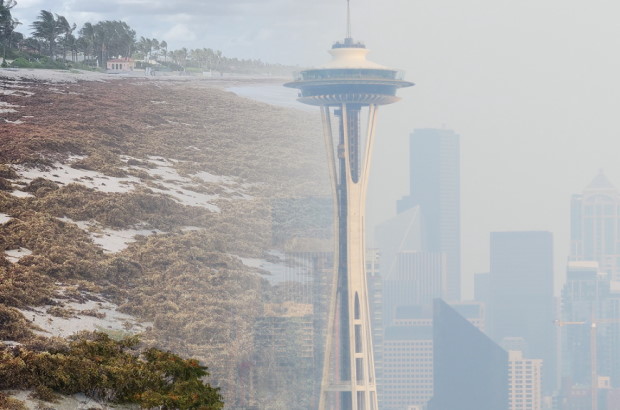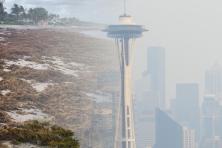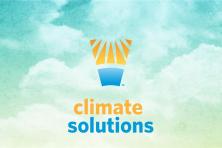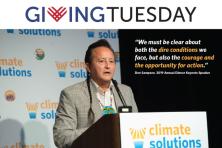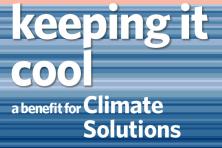It’s hard to watch the news, read an article, listen to the radio, or even go to a social event these days without some mention of an environmental disaster or climate catastrophe around our city, country, and the globe. As a longtime climate activist, it’s hard not to shake my fist at the smoky October air in the Pacific Northwest and scream at the top of my lungs, “I told you so!”
Amidst that, I daydream of if things would be different...
What if we named each major climate change-fueled disaster after a big fossil fuel company? I imagine more people would connect the dots faster. Yes, I’m looking at you, BP, and the $13 million you poured into Washington state airwaves to defeat putting a price on carbon pollution back in 2018 (clearly, I’m still not bitter about all the lies you spread)!
What if our elected officials were doing all that they can do to address the climate crisis, using their full power to address the biggest social justice issue of our collective lifetimes? (Click here to make sure your voter registration is up-to-date)
I daydream of philanthropists really putting their money where their mouth is on this issue, maxing out all their money now to address the biggest social justice issue that connects to so many other issues that they support.
It’s also hard at the same exact time to not feel like a failure. Many of us in the climate movement, including youth, have been working on this issue for a very long time. For me it’s because of values instilled in me from my culture and the people who raised me, what I was privileged enough to study in college, and what I’ve done professionally and as a volunteer the last two decades.
It’s hard to work every day on climate policy and witness such visceral and visible signs of the climate crisis right before our eyes. To see death tolls continuing to rise from the latest “natural” disaster, to see homes and livelihoods and basic rights to human necessities like clean water destroyed. It’s heartbreaking, overwhelming, and akin to experiencing PTSD for many of us in the movement.
Whether I’m trying to prevent things from becoming worse in India, where I was born, or in my adopted hometown of Seattle—remember when smoke, mosquitos, heat, and humidity were not part of our perfect balmy summer?—or my beloved home-away-from-home of Tulum, Mexico, where invasive blooms of sargazo seaweed just keep on getting worse.
What is sargazo? It’s sargassum seaweed, a type of macroalga. As sea temperatures rise, this seaweed reproduces with greater speed. Pollution in the ocean also contributes to larger quantities of sargazo. When this seaweed grows out of control, it can ensnarl miles of coastline, making recreational and fishing nearly impossible and causing lasting harm to marine ecosystems. It’s a devastating blow to the region’s biggest economic driver—tourism—that is already significantly impacted by the COVID-19 pandemic and drug-related violence (because of us tourists) and crime.
And as is always the case with environmental issues, those who are least responsible for the issue are the first and worst impacted. And just like COVID, because the pandemic is not over, Black and Brown communities are disproportionately impacted.
What we once thought of as inevitable is happening in real time, and the new “normal” should not be considered normal anywhere. Even if we don’t look up, the science and trends are overwhelming. And even though I’ve been feeling the lowest of lows lately on the climate crisis, I still feel hope too.
Because of worsening climate impacts worldwide, 2022 is among the most critical and consequential years to address the climate crisis. At the same time, we know that historic pollution is already baked into the atmosphere and our oceans, and that more impacts are all but inevitable. While the scale of the crisis is huge and our timeline for action is short, we still have an opportunity to limit the damage and mitigate some of the worst effects of this climate crisis. Many of the solutions and technology already exist and more investments are coming. A rapid transition is not only feasible but also is well underway, shifting away from fossil fuels and towards building new ways to power our economy with clean energy.
What stands in our way is the status quo. Overcoming this is the decisive work of our decade.
The core challenge of this new era is to turn our policy wins into tangible progress on the ground. It’s not enough to only pass good laws. We must also make sure that our leaders and agencies implement new policies equitably and inclusively, so that people and communities, especially people of color and those who have been first and worst impacted – and least responsible – for climate change experience tangible, broadly shared benefits, and our states achieve their desired goals. Fossil fuel pollution is not going to go away without a fight. We need to protect all that we have accomplished. And we need to move further and faster on climate action. In the words of MLK, Jr: It really is the fierce urgency of now.
There is more work to do—AND we could not do it without all of you. If you’d like to help, please consider supporting these organizations:
- Drinking water crisis in Jackson, Mississippi: Neighborhoods in Jackson, notably Black and lower income areas, have not had safe drinking water for far too long, and recent flooding has exacerbated the water crisis there.
- Hurricane relief for Puerto Rico: The news coverage has shifted away from the devastation of this island territory to what is going on in the mainland US
- Hurricane relief for Florida
- Floods throughout Pakistan
PS: Here’s a photo of in the “backyard” of the house that I rented with friends in Half Moon Bay, North Akumal, Mexico this past spring. I’ve heard it’s been even worse sargazo since I’ve returned to the Pacific Northwest. And my heart is broken for this little piece of paradise that will never be the same because of climate impacts in my lifetime.
